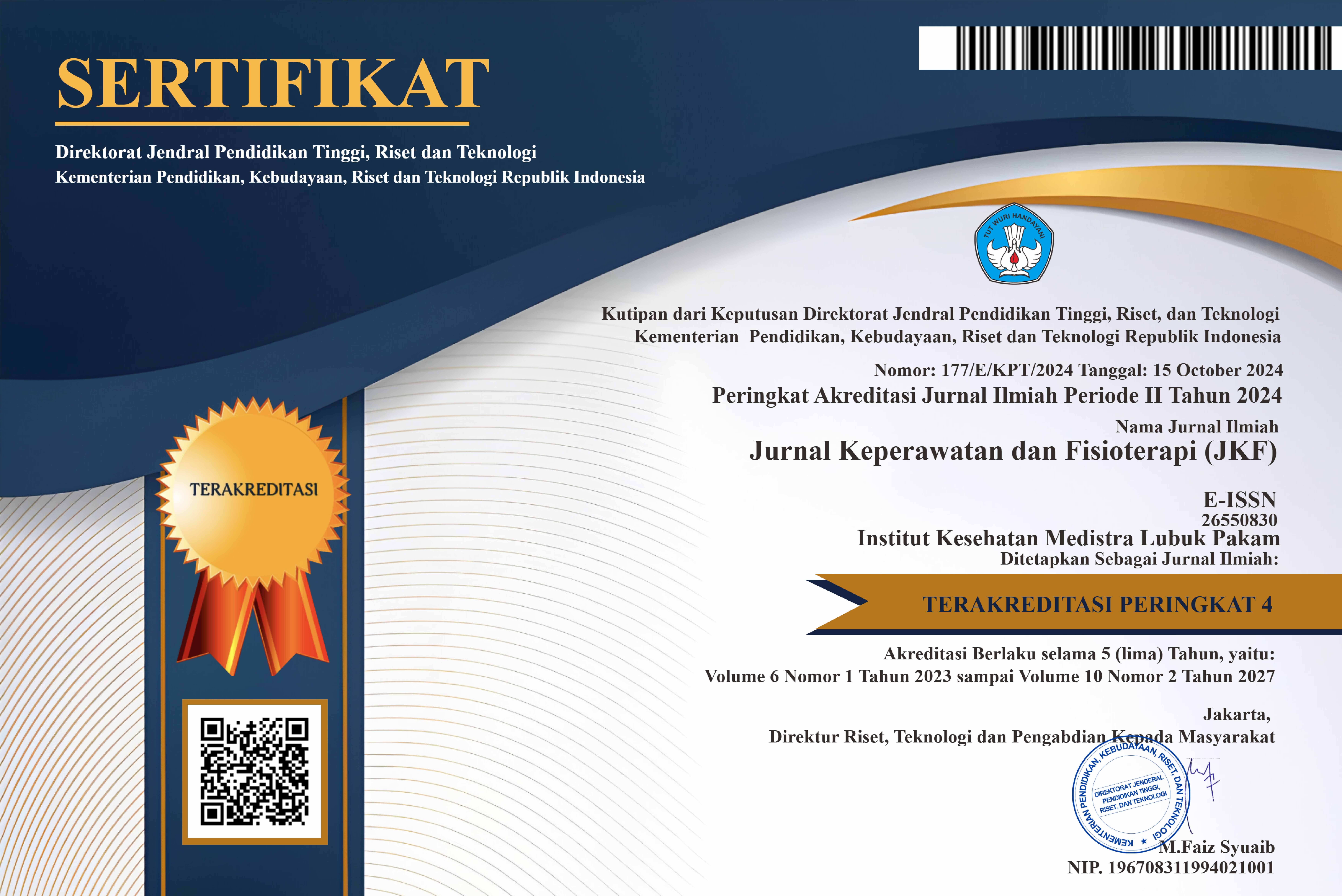The Relationship Between Emotional Intelligence Level and Conflict Management Strategies for Female Practicing Nurses with Dual Roles in the Inpatient Room of RSUD Sumedang
DOI:
https://doi.org/10.35451/jkf.v6i2.2043Abstract
The nursing environment is unique and has the potential for conflicts to arise. Effective conflict management is crucial for redirecting disputes in a constructive direction. Emotional intelligence , as an internal personality characteristic, significantly influences conflict management. This research aims to determine the relationship between emotional intelligence and conflict management strategies. A quantitative methodology was employed, utilizing Spearman Rho correlation analysis to analyze the data. The sample in this study consisted of 107 female practicing nurses with multiple roles in the inpatient ward of RSUD Sumedang, selected using the proportional random sampling technique. The alternative hypothesis (Ha) is accepted, indicating a significant relationship between the level of emotional intelligence and the conflict management strategies of competing, collaborating, compromising, avoiding, and accommodating, with significance levels and correlation coefficients, namely <.001 (-0.510), <.001 (0.614), 0.038 (0.201), <.001 (-0.757), and <.001 (0.688), respectively. Based on these results, it can be concluded that the level of emotional intelligence is positively correlated with conflict management strategies such as collaborating, compromising, and accommodating. Meanwhile, conflict management strategies involving avoiding and competing show a negative correlation. This demonstrates that selecting a constructive conflict management strategy requires a high level of emotional intelligence . Conversely, nurses possessing elevated emotional intelligence may lean towards avoiding or refraining from aggressive competition in conflict situations to preserve positive relationships among colleagues. Hence, there is a need for comprehensive development of emotional intelligence and conflict management training.
Downloads
References
Almost, J. (2016). Conflict within nursing work environments?: concept analysis. Journal of advanced nursing, 53(4), 444-453.
Aqqad, N., Obeidat, B., Tarhini, A., & Masa’Deh, R. (2019). The relationship among emotional intelligence, conflict management styles, and job performance in Jordanian banks. International Journal of Human Resources Development and Management, 19(3), 225–265. https://doi.org/10.1504/IJHRDM.2019.100636
Aseery, M., Mahran, S., & Felemban, O. (2023). The Relationship Between Emotional intelligence and Conflict Management Strategies From the Nurse Managers ’ Perspective. 15(3), 1–11. https://doi.org/10.7759/cureus.35669
Ba?o?ul, C., & Özgür, G. (2016). Role of Emotional intelligence in Conflict Management Strategies of Nurses. Asian Nursing Research, 10(3), 228–233. https://doi.org/10.1016/j.anr.2016.07.002
Cassano, F., Tamburrano, A., Mellucci, C., Galletti, C., Damiani, G., & Laurenti, P. (2020). Evaluation of emotional intelligence among master’s degree students in nursing and midwifery: A cross-sectional survey. International Journal of Environmental Research and Public Health, 17(17), 1–12. https://doi.org/10.3390/ijerph17176347
Chang, T. F., Chen, C. K., & Chen, M. J. (2017). A study of interpersonal conflict among operating room nurses. Journal of Nursing Research, 25(6), 400–410. https://doi.org/10.1097/JNR.0000000000000187
Chan, J. C., Sit, E. N., & Lau, W. M. (2014). Conflict management styles, emotional intelligence and implicit theories of personality of nursing students: A cross-sectional study. Nurse education today, 34(6), 934-939.
Gulo, A. R. B. (2019). Pengaruh pelaksanaan manajemen konflik oleh kepala ruangan pada motivasi kerja perawat pelaksana di Rumah Sakit Martha Friska Medan. Indonesian Trust Health Journal, 2(1), 113-120.
Lahana, E., Tsaras, K., Kalaitzidou, A., Galanis, P., Kaitelidou, D., & Sarafis, P. (2019). Conflicts management in public sector nursing. International Journal of Healthcare Management, 12(1), 33–39. https://doi.org/10.1080/20479700.2017.1353787
Latunusa, P. M., Timuneno, T., & Fanggidae, R. E. (2023). The effect of multiple role conflict and work stress on the performance of women nurses during the covid-19 with coping stress as intervening variables (Study at SoE Regional General Hospital). Journal of Multidisciplinary Academic and Practice Studies (JoMAPS), 1(1), 53–67.
Marlina, I., & Riyanto, A. (2022). Hubungan Kecerdasan Emosi Terhadap Kemampuan Manajemen Konflik Para Perawat. Jurnal Keperawatan Sriwijaya, 9(1), 1–6. https://doi.org/10.32539/jks.v9i1.147.
Martins, M. M., Trindade, L., Vandresen, L., Amestoy, S. C., Prata, A. P., & Vilela, C. (2020). Conflict management strategies used by Portuguese nurse managers. Revista Brasileira de Enfermagem, 73(Suppl 6), 1–7. https://doi.org/10.1590/0034-7167-2019-0336
Özkan Tuncay, F., Ya?ar, Ö., & Sevimligül, G. (2018). Conflict management styles of nurse managers working in inpatient institutions: the case of Turkey. Journal of Nursing Management, 26(8), 945–952. https://doi.org/10.1111/jonm.12609
Pitsillidou, M., Farmakas, A., Noula, M., & Roupa, Z. (2018). Conflict management among health professionals in hospitals of Cyprus. Journal of Nursing Management, 26(8), 953–960. https://doi.org/10.1111/jonm.12631
Raghubir, A. E. (2018). International Journal of Nursing Sciences Emotional intelligence in professional nursing practice?: A concept review using Rodgers ’ s evolutionary analysis approach. International Journal of Nursing Sciences, 5(2), 126–130. https://doi.org/10.1016/j.ijnss.2018.03.004
Trigueros, R., Aguilar-Parra, J. M., Cangas, A. J., Bermejo, R., Ferrandiz, C., & López-Liria, R. (2019). Influence of emotional intelligence, motivation and resilience on academic performance and the adoption of healthy lifestyle habits among adolescents. International journal of environmental research and public health, 16(16), 2810.
Utami, W., Apriono, M., Sudarsih, Putri, N. A., & Probowati, N. (2020). Performance of female nurses: Dual career, work environment and work stress. Annals of Tropical Medicine and Public Health, 23(8), 1309–1316. https://doi.org/10.36295/ASRO.2020.23818
Wijayanti, E. T., & Mudzakkir, M. (2019). Hubungan Kecerdasan Emosional Dengan Gaya Pemecahan Konflik Perawat. Jurnal Perawat Indonesia, 3(2), 159. https://doi.org/10.32584/jpi.v3i2.324
Wikansari, R., Mulyono, S., Kustina, K. T., Supraptiningsih, J. D., Liana, W., Sofyanty, D., Abdul, K. M., Khasanah., Rinaldi, K., & Liestyowati. (2022). Manajemen Konflik. Batam: Penerbit Cendikia Mulia Mandiri.
Downloads
Published
Issue
Section
License
Copyright (c) 2024 Ana Fitrianingsih, Heri Ridwan, Iyos Sutresna

This work is licensed under a Creative Commons Attribution 4.0 International License.
Copyright in each article is the property of the Author.


























